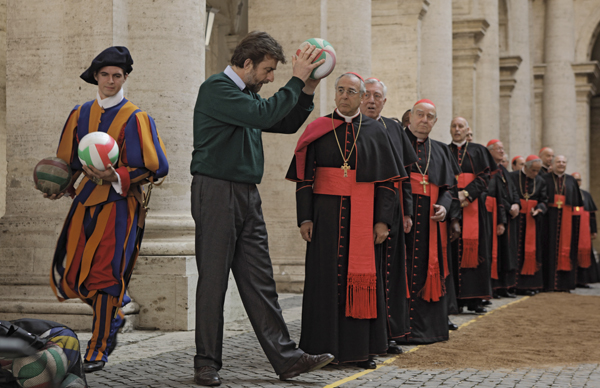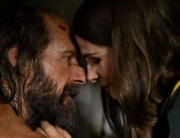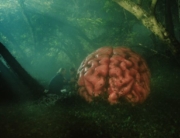
Director Nanni Moretti, as a psychoanalyst, and the cardinals at play (Sundance Selects)
What if the 180-member College of Cardinals held a papal election, and no one convening within the Sistine Chapel wanted to become head of the Roman Catholic Church—even after the wafting of white smoke has announced a new pontiff? In Nanni Moretti’s ambling comedy, all of the cardinals take a moment to pray that he’s not the one selected—some quietly, some pleadingly—before the second round of votes are cast. As if reading one another’s thoughts, the men pick the safest, least offensive and obvious candidate, who has blended into the background. Upon his election, the soft-spoken Cardinal Melville asks, “What do I do now?” before weeping and becoming immobilized by a case of stage freight on a global scale. The media corps and the thousands gathered in St. Peter’s Square are kept waiting for an announcement while he shuts himself off in his bedroom. The only reason why a viewer would even have taken notice of the French clergyman within the first 10 minutes is because he’s played by the great Michel Piccoli. Sixty years ago, the avuncular Piccoli, now 86, worked with Jean Renoir in French Cancan and a decade later in Jean-Luc Godard’s Contempt, before his collaborations with Luis Buñuel.
However harsh or critical this summation may sound, director/co-writer Moretti takes an entirely different, softer approach, that of a gentle comedy of manners. The cardinals are on their best behavior, not sure about what to do while trying to contain their confusion. To rid Melville of his physical and mental parayalasis, the Vatican’s press office arranges for the new pope to see a psychoanalyst (Margherita Buy), who has no idea that her new patient is His Holy Father. Leaving her building, he shirks off his handlers, and takes off on the lam. That elderly gentleman in his eighties asking to use your cell phone? He might be the successor to Saint Peter.
Back in the Vatican, none of the cardinals knows that the new bishop of Rome is anonymously loitering on the city’s streets, where he finds a temporary refuge with a theater company mounting The Seagull. (Maybe that’s the tip-off of what Moretti aims for, a melancholic mixture of humor and pathos, but without the bite.) Ironically, Melville has always wanted to be an actor, yet he has none of the savvy of a public speaker or leader.
The man-behind-the-curtains pulling the strings and covering up any hint of scandal is the Vatican’s spokesman (Jerzy Stuhr) while the world waits in the dark. No announcement has been made, and none of the whispering has leaked out of the Vatican. The cardinals, who are ostensibly trapped until the new pope makes his first appearance before the world, are almost like the hostages in Ann Pritchett’s novel Bel Canto, where opera is the unifying balm for an international mix of terrorists and bystanders trapped within an embassy for weeks. Although the cardinals aren’t literally held by gunpoint, they have more than enough time on their hands. The spirit-lifter here becomes a volleyball tournament, with the little team representing Oceania, all of three Aussies, turning into the Cinderellas of the competition.
If Moretti intended to gently scold tightfisted conformity/group-think or paint the Church as a master of PR spin, he loses steam. His beautifully-rendered Vatican takes place within a sealed-off vacuum, free from the controversies that have roiled the Church over the past decades. There’s no wheeling or dealing, no factions pitted against another. (How did milquetoast Melville ever rise up the ranks?)
The Church has long been the target of potshots by Italian filmmakers, particularly Pietro Germi and his 1960s satires—all harsh in comparison. This time the Church gets off easy. We Have a Pope’s nowhere as critical as Moretti’s earlier film The Mass Is Over (1985) or Marco Bellocchio’s sardonic My Mother’s Smile (2002), about the canonization of a battleaxe. By removing theology and politics altogether, this is the pope as celebrity icon, not religious leader. (Come to think of it, We Have a Pope’s not that far removed from Roman Holiday, replacing a media-magnet of a princess with a flighty father of the church.) The film ribs an easy target, though, in the form of an insipid Italian TV reporter covering the election as if it were a horse race.
After a long setup, the film chases its own tail. How many scenes do we need of a Swiss Guard parading around the pope’s apartment in a ruse to fool the world that the new pope is up and about? And the script never gets to the bottom of Melville’s quandary. His terror remains a little too abstract and the film entirely innocuous and mild mannered.






Leave A Comment